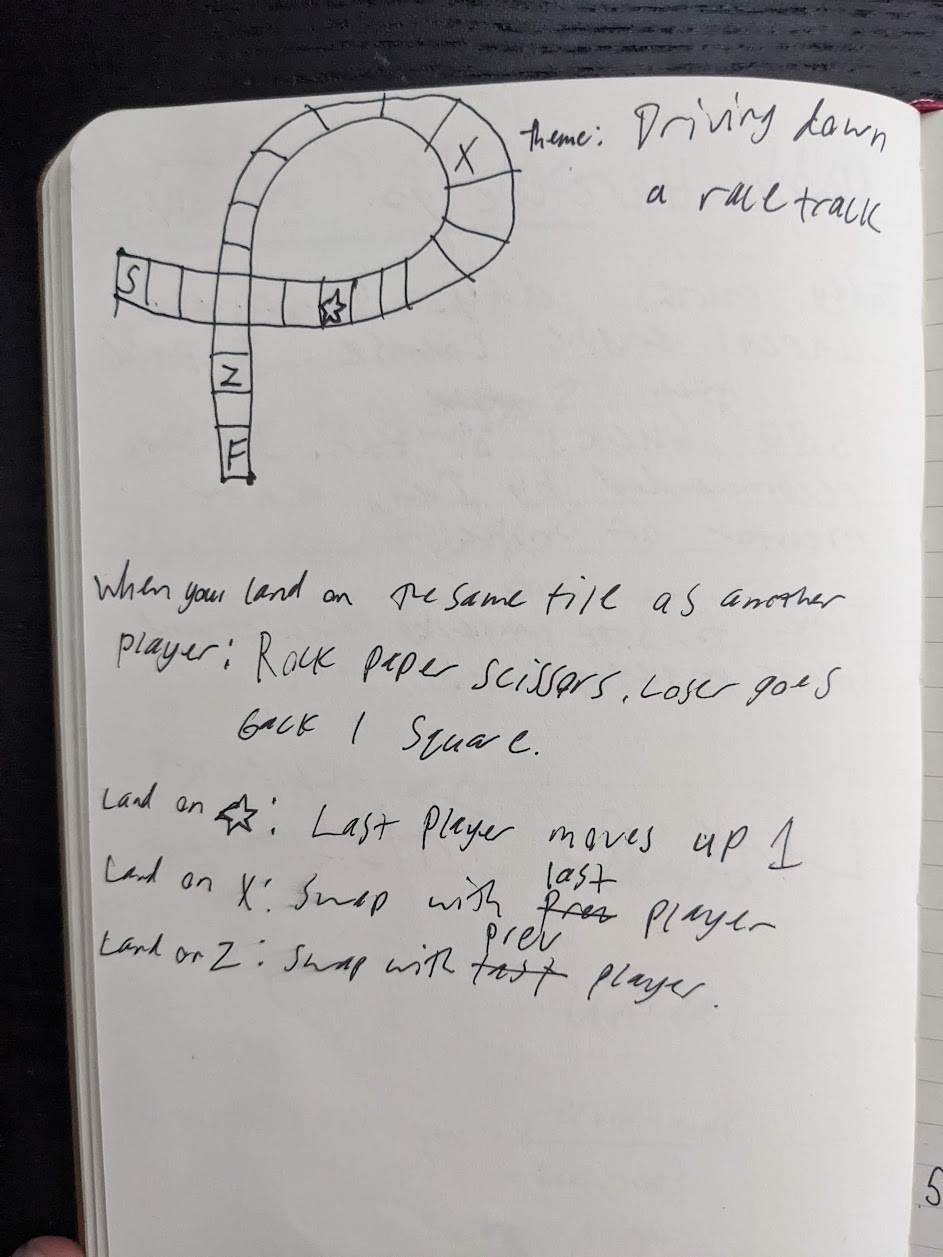
November 8 - 14, 2021
Last week I didn't get a chance to touch on the Game Design Improv, a workshop run by Ian Schreiber. It was worthwhile and a reminder that ideas are dirt cheap, so use that to your advantage! Come up with many ideas and watch them fail. Eventually, you'll discover something great and keep iterating.
The first portion of the workshop was about designing a “track” board game (think Candyland) in...15ish minutes? Here is the process:
Here's what I came up with (yes my handwriting is terrible):

- a quick aside about resonance -
Resonance occurs when the theme is present throughout the entire experience. My theme was an F1 race with players racing to finish first. A “resonant” factor of my game is when players land on the same space; they try to overtake each other. A “non-resonant” factor is that I inserted Rock Paper Scissors as the mechanic to decide who overtakes who. People who understand F1 will be taken out of the experience because they understand it's more complicated than that. The bright side about the RPS minigame is I can always swap it with another minigame that fits the theme better.
It's fascinating because game designers need to live many experiences to evoke different feelings in their players. If I ever want to make a racing game, I should study racing and try my hand at it. Otherwise, I'm lying to my players. I'll dig more into resonance in a future blog post.
- end resonance aside -
Next up, we did some basic level design where everyone picked a spot in a 5x5 grid and drew something in it. I don't have access to the screenshot I took, but I'll update this post when I do. This segment was my least favorite. The message was basically “level design is easy when you have a ton of people throwing out ideas.” I can't be too harsh, we only had an hour.
Finally, we got into groups and designed a game that could be played using zoom as the platform. Like the last workshop, this was my favorite part. I was designing with other designers! It was collaborative and we made sure everyone got to speak their ideas. We created a maze game where each player starts at a unique entrance and searches for treasure. One main player has GIMP or Photoshop open and designs the map. Before the players see it, the main player blocks it with a Fog of War. The other players then work their way through it and whoever has the most treasure by the end wins.
Thankfully, I have a lead game producer in my tiny circle of game industry contacts. I set up a quick meeting with him to ask about some essential skills I should be working on to excel in game design. He mentioned (off the top of his head) collaboration, influence, and creativity. “Can you get a dev to throw together a flying prototype to test your awesome idea and work together to iterate on it?”
I also got a better idea of the different types of game designers. Here's a non-exhaustive list.
I plan on finding someone in each field to go in-depth on their discipline. Afterward, I'll do a write-up and share my findings somewhere on this blog.
Game design requires creativity and inspiration fuels that. Because of that, I'm getting back into skateboarding. I owe a lot to it. Skating is the reason I know how to pick myself up when I fall; easily one of the most important life lessons I've ever learned. So it was perfect timing when I stumbled upon this interview with Rodney Mullen, a legendary skater.
"Find joy in what you do for the sake of it." Got me good.
I'm not sure why I was nervous about picking up C++ while learning UE4. I've always used C# and assumed there would be a more significant learning curve to picking up C++, but I was wrong. Tom Looman's course has helped immensely with onboarding onto UE4. I hit a few issues he didn't seem to hit early on, so I'd pause and get stuck for a little while. Then I realized he mentioned it a few minutes later. It also helps that UE4's API is highly polished. There are so many helper functions that do the work for you. Check out this (70MB) GIF of what I have so far.
It's insane that an engineer can toss in a mesh with all its animations and “it just works.” The engine has built-in code that gives you fully moveable characters within minutes. My game design self can appreciate this because of rapid prototyping. My engineering self is endlessly curious about what's happening under the hood. I first learned game programming with XNA and MonoGame, and I can't imagine how many lines of code it would take to get something like this working.
Buckle down and continue working on this course in my free time.
A game design mentor mentioned a side project he works on during his free time. I should ask him more about that.